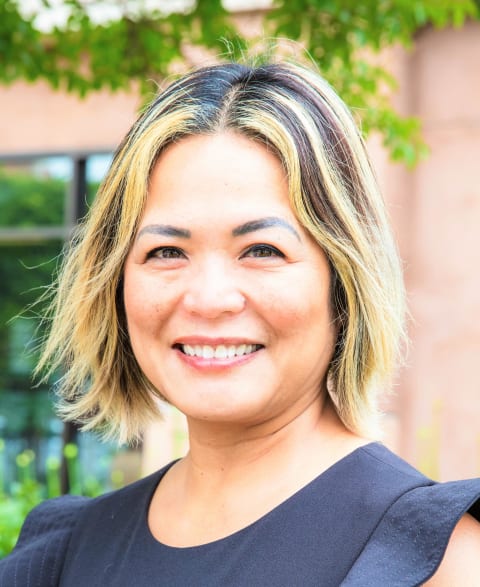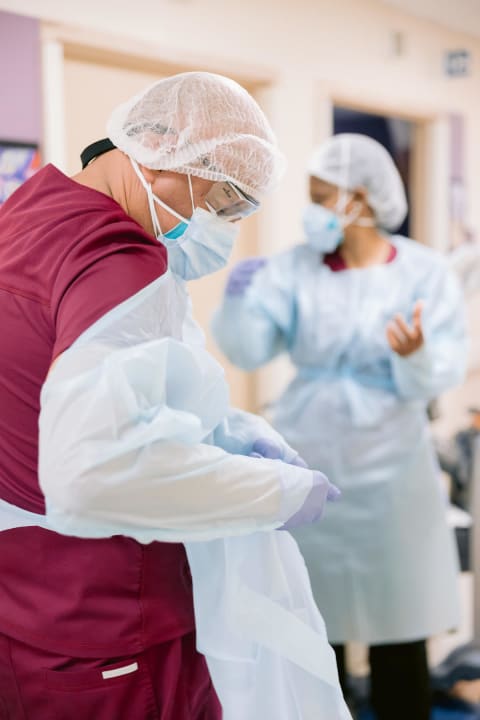
Sacred Space
Story 83

Angela Zuidema, LMFT, works in a sacred space: A place where those on the frontlines of healthcare can talk about and heal from grief, anxiety, conflict and trauma.
Angela is a mental health consultant at Adventist Health White Memorial, a hospital in the heart of Los Angeles that employs more than 2,000 associates. Many of the caregivers, physicians, and other staff are facing immeasurable stress that started when the pandemic began two years ago and has not let up. Angela says she hasn’t seen anything like it in her nearly 13 years working with the hospital.
“COVID-19 is a lingering thing that causes trauma every single day,” she says. “We are collectively feeling the grief and loss caused by the pandemic, and healing continues to be challenged by its disruptive surges. However, many people have also become more focused on their health, family, social connections and wellness."
"COVID-19 is a lingering thing that causes trauma every single day."
A licensed marriage and family therapist, Angela served for nearly 20 years with Orange County, Calif., before starting her work with Adventist Health. During that time, she focused on family and individual counseling, as well as child and play therapy. When her kids were nearly out of high school, Angela was ready for a career change. At that time, she saw an ad for a counselor at White Memorial. For nine years, she served employees and staff through the Employee Assistance Program, connecting them to resources for emotional, legal, financial and other types of support.
“Then, in 2018, I transitioned to providing services to medical residents,” Angela says. But in early 2021, a generous donation came in that changed Angela’s career once again. “The Foundation reached out to me to say, ‘We can bring back your service to the entire hospital,” she recalls.

The timing couldn’t have been better. With the unrelenting stress caused by the pandemic, staff had been seeking Angela’s help more than ever. Angela now provides support on-campus in the form of individual counseling, department rounding, assistance with crisis management, support groups and more.
“When I’m with a client, I'm able to give them resources and tools they need to handle life’s stressors and adapt to change in any difficult times they're experiencing,” Angela explains. “Mental health has changed since COVID. It’s much more in the forefront, and people are much more open to talk about it.”
This is good, Angela says, because to heal from trauma, you first have to talk about it. “You will hear some people say, ‘I just slip it under the rug,’ or ‘I don't deal with it,’ but if you don't deal with it, it just stays with you wherever you go.”
“I’m here to listen to them and give them the sacred space to feel safe and secure at that moment.”
Angela’s presence and availability on-campus offers a feeling of safety and security for associates. Some people come in for one session, some for an occasional visit, and others are regulars. Sometimes, the intervention looks like a checklist of healthy ways to cope. Other times, it’s just a safe place to talk.
“It’s normal to have depression and anxiety,” Angela explains, “but you need to cope, you need to adapt, you need to deal with it as it comes.” This is especially imperative in healthcare, Angela says, and she should know after 13 years of helping hospital staff. “Mental health means you need to take care of you,” she says.
She says because of the events over the past couple of years, people are more aware of the need to talk about mental health and seek help themselves. “[I’m here] to listen to them and give them the sacred space to feel safe and secure at that moment,” Angela says. “It's a good thing. I think mental health is here to stay. It’s a part of life, really.”
Related stories

Todd Reese

Chris Garcia

Randi White

Jeff Musser

Sarah Gutierrez

Cory Ferrier

Juan De La Cruz

Mara Bryant

Diana Erdmann

In His Footsteps

Gary Obreque

Heartbeat in a Bottle

Wes Rippey

Adam Lee

Erasmo Cortez

Heather Thompson

John Hay

Cheri McCall

Valerie's Journey
